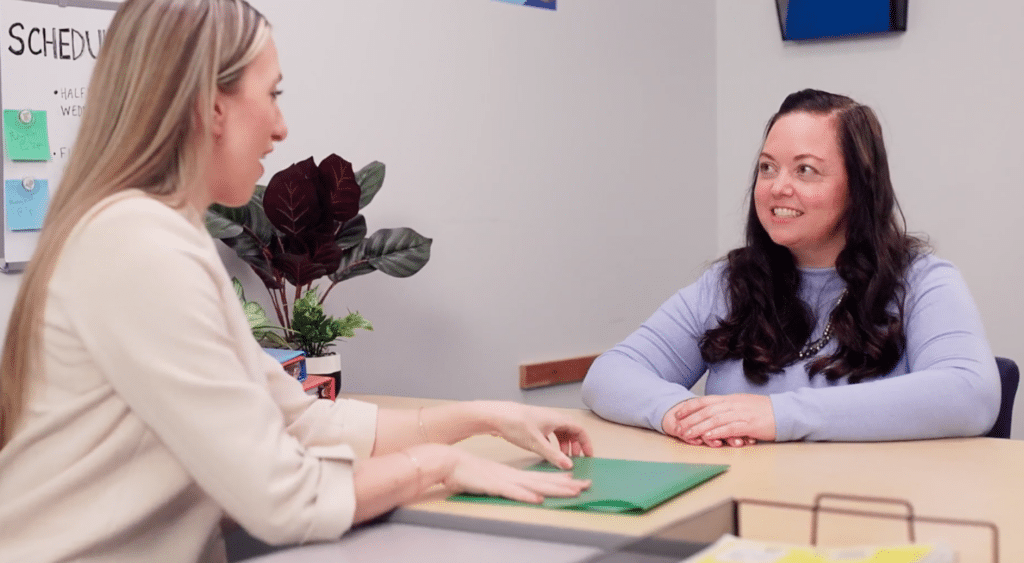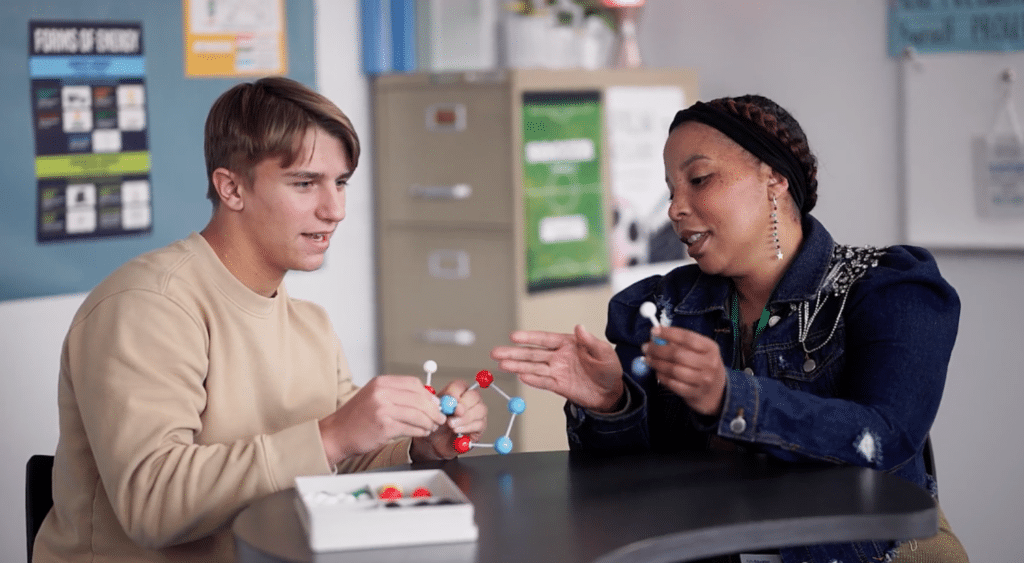An example tutor job description.

Working as a tutor in schools is a fulfilling career where you can truly make a difference in students’ academic growth.
Whether you want to become a tutor for ELA, literacy, mathematics, science, social studies, or history, the structure of the tutor job description is about the same. They all detail information about tutoring jobs, like tutor qualifications and responsibilities, as well as reporting hierarchies. Some even share the tutor salary or pay scale.
At Kelly Education, we hire tutors for school districts across the country. So, we have incorporated the best practices in our general tutor job description. Be sure to review the school district’s tutor job description for the specific role for which you are applying. Never take a job without first reading the job description.
Job goal.
At a very high level, school districts should explain the tutoring job. For example: Tutors support student learning by helping students grasp key classroom concepts, assist with homework, projects, test prep, and other academic tasks. This role involves working one-on-one or in small groups, either in-person or virtually, under the direct supervision of school personnel.
Tutor qualifications.
The qualifications listed in the job description are the minimum requirements you need to perform tutoring duties. These qualifications are typically broken down into:
- Education: Requirements vary by district; some require a college degree, while others accept a high school diploma. Always review the specific job description for qualifications in the district where you are applying for a job.
- Competence: If tutoring in a specific subject like math, proficiency in that subject may need to be demonstrated. Certifications and specialized training can help.
- Professionalism: A professional attitude must be maintained by dressing appropriately, being punctual, consistent, dependable, and collaborative. Additionally, you must be patient, a positive role model, and adaptable in problem-solving.
- Computer Literacy: Be comfortable using the school’s computer systems, especially if lessons involve technology.
- Personal Skills: The ability to follow all school district and agency guidelines, stay organized, manage your time well, maintain confidentiality, and communicate effectively with students, parents, and the support team.
Note that the qualifications listed here may be tailored to each school district to meet the needs of their students.
The tutor skillset.
Here’s a list of common skills outlined in the job description for a tutor.
- Experience working with students, especially within the age group you’ll tutor
- Ability to work effectively one-on-one or in small groups
- Skill in reinforcing and following the curriculum taught in class
- Commitment to supporting each student’s academic goals
- Availability for flexible learning hours
- Proficiency in providing constructive feedback to teachers, administrators, and parents
- Consistency and reliability in building relationships with students and their support teams
- Fluency in the language of the student you are tutoring
- Ability to clearly communicate instructions, theories, and concepts to different age groups
- Strong organizational skills for managing your schedule
- Creativity and adaptability in presenting lessons to enhance student understanding
- Patience with students who need extra time and guidance
These skills not only make you a successful tutor but also lay the groundwork for future careers in teaching, coaching, or school administration.
Reporting hierarchy.
Most jobs, including tutoring, have a chain of command. When working in a school district, tutors are usually supervised by the school principal, school tutoring program manager, schoolteacher, another district/school designee, or liaison.
Tutors receive day-to-day instruction, supervision, training, and teaching curriculum from the district/school.
Tutor duties and responsibilities.
The school district will typically create the lesson plans and instructional support activities the tutor will carry out while tutoring. The district may also provide pacing and evaluation guidance to measure the student’s progress.
Your responsibilities as a tutor will typically include:
- Administering planned assignments given by the school district or teacher.
- Understanding and following student privacy laws.
Unacceptable duties/responsibilities for the tutor role.
Working closely with administrators and teachers within a school district means you will build meaningful relationships. While you may want to help in any way you can, you must avoid situations that violate policies or may cause harm to you or a student.
You’ll generally see these in tutor job descriptions.
- Never administer medication to a student.
- Never move or touch a student physically.
- Never be alone with a student in a private setting.
- Never transport students in a vehicle.
- Don’t discuss fees or rates.
- Never plan to work with students outside of school or without the involvement of a supervisor.
- Don’t contact students or families outside the work environment, including on social media, texts, emails, and calls.
Tutor salary expectations.
Many tutor job descriptions also list a tutor salary. Salary, pay scales, and other compensation can vary depending on state employment laws, the school district’s budget, number of students, and work hours.
Beyond the job description: The characteristics of a quality tutor.
Certain traits set exceptional tutors apart, creating the human connection students need to thrive academically and socially. These are typical characteristics of a tutor.
- Encourages students to think critically and deeply
- Takes the time to help students understand and learn from their mistakes
- Demonstrates and teaches the value of collaboration
- Motivates and inspires students to enjoy learning
- Guides students toward becoming self-reliant and responsible
- Seeks ongoing training to stay current on effective tutoring methods
Students facing learning challenges can easily become frustrated and feel like giving up. A great tutor provides the encouragement and accountability needed to help them push through these obstacles and keep moving forward.
So, why become a tutor?
Tutoring jobs are incredibly rewarding—especially when you help a student overcome academic challenges and see their grades, confidence, and enthusiasm for learning grow. Beyond the impact on students, tutoring also offers personal and professional growth opportunities.
- Builds leadership skills
- Access to professional development
- Expansion of your professional network
- Flexible scheduling
As a tutor, you have the chance to make a meaningful difference in a student’s academic journey, boosting their confidence and fostering a lifelong love of learning.
Ready to apply for a tutor position?
At Kelly Education, our tutors work 1:1 or in small groups, using district-provided curriculum. We recruit tutors who demonstrate that they are culturally competent, reliable, and qualified to help students in the subjects where they need support. We also provide tutoring to students who are multilingual learners, students with disabilities, and at-risk students.
Interested in a tutoring or other education job near me? Fill out our brief interest form, and one of our recruiters will contact you to answer your questions and share more about opportunities to work as a tutor with our school district partners.

View Related: Article Job searching
You might like
Do substitute teachers get health benefits?
3 minute read
Do substitute teachers get health benefits?
3 minute read
Find your next job
Discover thousands of temporary, full-time, and remote jobs for beginning and experienced job seekers.


